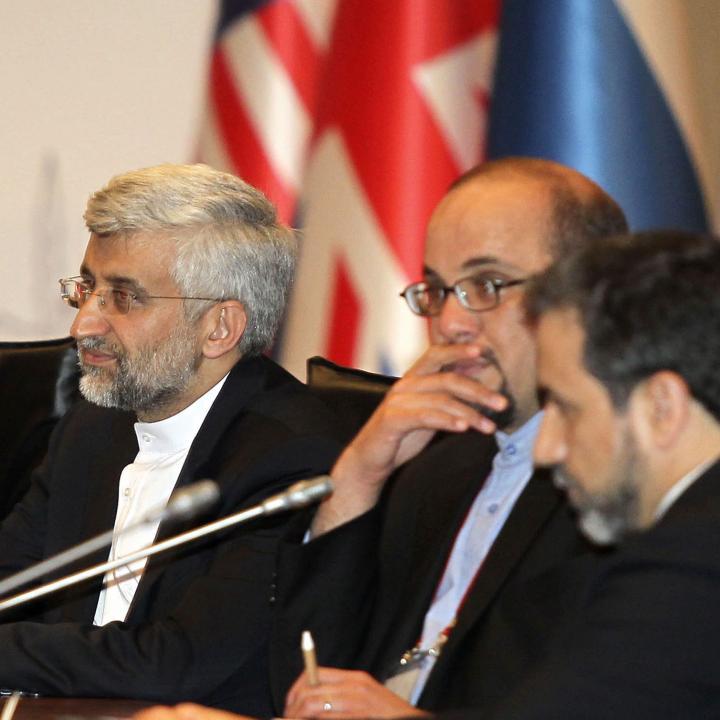

If Washington does not maintain pressure on Iran, it will validate the regime's strategy of defiance, provocation, and delay.
The United States holds a strong bargaining position going into Friday's scheduled nuclear talks with Iran. An Israeli military attack seems imminent. U.S.- and European Union-led sanctions on Iran's Central Bank and oil exports are wreaking havoc on the Iranian economy. And yet, despite these massive pressures on the Iranian regime, it is not Tehran but the United States that is signaling that it is prepared to make concessions -- setting the stage for Washington's unprecedented leverage to be squandered.
The United States and its Western allies reportedly plan to demand that Iran suspend its higher-level enrichment activities, a position Secretary of State Hillary Clinton previewed in comments to the press April 1. The New York Times, citing American and European diplomats, also reported this weekend that Washington plans to insist that Iran close its Fordo uranium enrichment facility, which is buried beneath a mountain near the holy city of Qom.
Such demands appear designed to allay near-term threats of conflict by stopping Iran's progress toward possession of weapons-grade highly enriched uranium, which would reduce the time Tehran needs to make a nuclear bomb. These demands also aim to keep Tehran from burying its nuclear work beyond the reach of airstrikes. In other words, the demands seek to prevent Iran from entering what Israeli Defense Minister Ehud Barak has called a "zone of immunity," or passing a point at which a military strike would no longer be able to end its weapons-related nuclear activities.
This approach has two big flaws. One, it would be a strategic error to focus narrowly on the near-term concern of an Israeli military strike. U.S. negotiators should be looking at the underlying threat posed by Iran's nuclear program. While Iran's production of highly enriched uranium and its work at Fordo are worrisome, they are just two manifestations of a much broader nuclear program that lacks any compelling civilian rationale (because medical reasons of the sort Tehran cites could not justify an enrichment program of the scope it has built) and whose main lines of work -- enrichment at the Natanz site, construction of the Fordo facility and weaponization research -- were clandestine until exposed by intelligence agencies.
Two, even if Iran acceded to such demands, the status quo would largely return to the point at which the Obama administration pitched its first compromise proposal in October 2009. The difference is that, since 2009, Iran has amassed a large quantity of enriched uranium and conducted further research and development on new centrifuges and ballistic missiles. It has probably engaged in other work related to nuclear weapons that is not yet publicly known and might be secret from foreign governments.
In exchange for its return to an enhanced status quo ante, Iran would receive major benefits. Washington is likely to offer some combination of commitments to refrain from new sanctions and to ease existing sanctions. This would give Iran a break from the withering pressures it has faced of late, while also providing an even more valuable incentive: implicit legitimization of Iran's lower-level uranium enrichment activity, which has long been the target of Western ire. The Iranian regime would have cover to maintain its nuclear infrastructure and bureaucracy and engage in other nuclear work, such as perfecting existing centrifuges and developing new ones that are less reliant on imported materials. Iran could use the lull to enhance its technical capabilities and prepare to later resume its nuclear march at an accelerated rate.
Rather than maintaining a narrow focus on closure of the Fordo plant and suspension of Iran's program of highly enriched uranium, the United States should insist that Iran suspend all of its uranium enrichment activities, take steps to address International Atomic Energy Agency concerns about its nuclear work, including coming clean about its weaponization research, and submit to intrusive monitoring and verification. Far from extreme, these points are what are required by U.N. Security Council Resolution 1929 and preceding resolutions, to which Britain, China, France, Russia, the United States and Germany (the P5+1) have previously agreed. The Obama administration should also insist that Iran roll back the work it has done since those resolutions passed -- such as by transporting its enriched uranium stockpiles out of the country, dismantling the Fordo facility and stopping work on advanced centrifuges.
Only if Iran takes these steps can the United States and its allies be sure that it will not use negotiations to buy time or perfect its nuclear weapons capabilities. Washington must keep up the pressure until Iran does so. Doing any less would waste precious leverage that has taken years to build and would validate the Iranian regime's strategy of defiance, provocation and delay.
Michael Singh is managing director of The Washington Institute.
Washington Post


